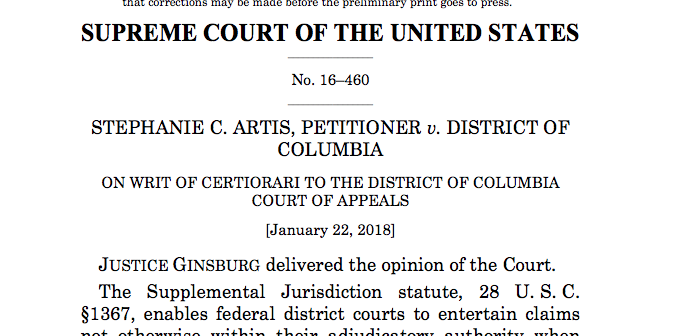- Free Consultation: (631) 352-0050 Tap Here to Call Us
State Claims Tolled While In Federal Court

As Long Island employment lawyers, we keep up to speed with developments in employment law. Equally important though, is staying updated with questions of procedure. On January 22, 2018, the United States Supreme Court issued a decision relating to the statue of limitations for state law claims which are initially filed in federal court, but later dismissed.
Supplemental Jurisdiction: State Law Claims Brought in Federal Court
Employment laws are created by federal, state, and sometimes local laws. In other words, when an employee faces sexual harassment in the workplace (for instance) the employee’s claim may be brought pursuant to Title VII which is the federal workplace anti-discrimination law. But, in New York, the employee may also bring the claim under the New York State Human Rights Law and if the employee worked in New York City, the claim may be brought under the New York City Human Rights Law. Since the employee is using a federal statute, as well, the entire case may be filed in a United States District Court. Generally (and without discussion of the exceptions which may apply) cases involving just claims arising under state law cannot be heard in a federal court because the federal courts are courts of limited jurisdiction. But if state and federal claims are related, a federal court can exercise supplemental jurisdiction and the court can hear all the claims at once.
Dismissing Federal Claims But Not State Claims
In employment law, New York’s discrimination laws generally mirror federal law, meaning the laws are interpreted and applied in the same way. When the laws are the same, judges can make decisions about a case, and apply those decisions to both the federal and state claims. For example, if an employee brings a case of race discrimination under both Title VII and the New York Human Rights law, claiming that he was terminated from his job based on race, a judge will look at the case the same way under federal and state law, because the laws are applied the same way. So, if the judge believes the case should be dismissed, he can dismiss both claims “with prejudice,” meaning neither claim can be brought again.
If, however, the federal and state laws are different, a judge’s decision may not apply to both claims. For example, both federal and state law prohibit discrimination based on an employee’s disability. But New York law defines disability differently than its federal counterpart, the Americans with Disabilities Act. So, an employer may ask a judge to dismiss a disability discrimination case, arguing that the employer is not covered by the law because the employee is not disabled. If it is clear that the employee is not disabled under federal law, but the judge cannot determine whether the employee is disabled under state law, the judge can dismiss the federal claim with prejudice. Then, since there is no more federal claim in the case, the judge can dismiss the state law disability discrimination claim without prejudice. In that case, the employee can re-file the state law disability discrimination claim in a state court.
How Long Do I Have to Re-File a State Law Claim
In Artis v. District of Columbia, the United States Supreme Court set the time limit by which an employee can re-file a state law claim which was dismissed without prejudice from a federal court. Federal statute 28 U.S.C.§ 1367(d) states that state claims are tolled while the claim is pending in federal court. The majority of the Supreme Court justices, including Chief Justice Roberts, held that the term “tolled” means that the “clock is stopped” while the state claim is pending in federal court. In other words, to determine the time limit to re-file a state claim, add the time that the claim was pending in federal court to the statute of limitations set for the particular claim. The resulting time will identify the statute of limitations for filing the claim in state court.
Long Island Employment Lawyers
Questions of statute of limitations and jurisdiction can be complicated in employment cases. If you have questions about employment discrimination contact a Long Island Employment lawyer at 631-352-0050 or on the internet at https://www.linycemploymentlaw.com.








